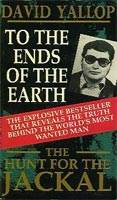framing
David Yallop proved international terrorism a fraud
On Friday 27 June 1975 a young Venezuelan burst from a Paris apartment straight into the world's headlines.
He left for dead four men. He had previously blithely lobbed a grenade into a crowded café, attempted to assassinate the President of the Zionist Federation of Great Britain, seized the French Embassy in Holland, and launched two rocket attacks on planes at Orly airport. His crimes were apparently endless. He went on to kidnap the OPEC ministers in Vienna.
He is known to the world as Carlos. The press dubbed him the Jackal. Security forces considered him The World's Most Wanted Man.
David Yallop tracked Carlos down to a small village in the Bekaa Valley outside war-torn Beirut. Through two long nights he listened to part of Carlos's story. Then, under tragic circumstances, the trail went dead.
For the next seven years, Yallop tried to rediscover Carlos the Jackal, but what began as a manhunt became a journey into a frightening world of terrorism, espionage and Middle Eastern polictics.
Open Letter to a Demoralized Peace Movement
A response to: "Love America or We'll Kill You" by Richard Rhames
Richard,
You seem to have found yourself on the wrong side of the "war on terror," a fraudulent, fictional war that needs some serious deconstruction.
As Goehring told the world, the "leaders" only need to tell the nation that we are "under attack" and to "denounce the pacifists for lack of patriotism and exposing the country to danger." This Nazi formula for imperial conquest has a long history of working. It is being employed today at a steady drumbeat.
Framing the 9/11 Cover-Up
UC Berkeley linguistics professor, George Lakoff teaches how selective use of words or "frames" can empower propaganda. In an interview with Lakoff [1], Lorna Tychostup summarizes Lakoff's thesis "The definition behind any particular frame may or may not represent the actual truth, but after hearing or reading that frame enough times, the set of beliefs the frame evokes becomes the truth. The real truth dissipates as it is replaced by a false truth—or in some cases, more simply put, a lie."
- byerley@theriver.com's blog
- Read more
- Login to post comments
Framing aided by repetition, psychologists report
Framing aided by repetition, psychologists report
Better to refute adversaries' slogans with different, positive statements than to repeat them in an attempt to disprove
Psychologist Norbert Schwarz has found it reinforces untruths to repeat them, even when refuting.ANN ARBOUR, MI, Sept. 27, 2007: New research confirms that repetition of "myths" and slogans helps lodge them in the minds of the public and that refuting them often leads only to the public remembering falsehoods better. Instead, they tell us that "education campaigns with an 'affirmative' message," even if it is a negative message, are far more effective in defeating an adversary's frame.
University of Michigan social psychologist Norbert Schwarz has done experiments showing that people remember things they hear repeated often enough, regardless of its source, and even if it's from a single source.
There is more of interest in the article at: http://www.harperindex.ca/ViewArticle.cfm?Ref=0098
Mike Zimmer
http://www.TheProgressiveMind.info
Back to Basics (Truth v. Lies)
In a recent blog, a highly placed truther (Griffin?) suggests ignoring the specific disinformation agents, and focusing on the historical record of disinformation tactics.
This may be more of an academic exercise than a public relations strategy, however.
I would suggest rather that we instead frame the issue on our terms (in places where a mainstream audience dwells). This would render the "theories" moot and irrelevant.
1. Validating the need for truth.
How many lies can you find uttered by high ranking government officials? We should start a web page with just that debunking of official statements. My own favorite is Ari Fleischer aboard air force one on 9/11: "No warnings."
2. Similarly, we have the omissions, the substantial facts that were never investigated. Another page could list exhaustively all the omissions we can find. Griffin's work is excellent in this regard.
3. The synthesis: They lie, so we want the truth.
If we can prove dishonesty, omission, and worse, we are vindicated. We retain the high ground, as well as a solid grounding not based on flights of fancy, opinion, or deception.
Cognitive Dissonance question for Rockridge Nation
I posted the following article on Rockridge Nation, the community branch of the Rockridge Institute, the think tank for progressive politics. My goal of the article was to highlight the recent paper in The Journal of 9/11 Studies about acceptance of 9/11 truth to a new audience who is interested in this kind of topic, and challenge Rockridge to explore the topic of 9/11 in their work. Obviously the careful introduction is not necessary for readers of this site; I'm just cross-posting it here in case anybody wishes to comment on the issue over on Rockridge Nation.
http://www.rockridgenation.org/questions/analysis-of-cognitive-dissonance-on-the-topic-of-sept-11
With the sixth anniversary of the attacks of the 11th of September coming up tomorrow, I wanted to share an interesting paper I read recently and present a challenge to the Rockridge community and deep-thinkers on staff. It's about the psychological barriers that the concept of 9/11 puts in people's minds and how they react to information that lies outside of their belief systems.
